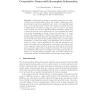78 search results - page 13 / 16 » Investigating Organisational Structures with Networks of Pla... |
JAIR
2008
13 years 9 months ago
2008
It is well-known that acting in an individually rational manner, according to the principles of classical game theory, may lead to sub-optimal solutions in a class of problems nam...
ACAL
2007
Springer
13 years 11 months ago
2007
Springer
This paper addresses the topic of how architectural visual experience can be represented and utilised by a software system. The long-term aim is to equip an artificial agent with ...
DAWAK
2001
Springer
14 years 2 months ago
2001
Springer
A fundamental task in multi-agent systems is matchmaking, which is to retrieve and classify service descriptions of agents that (best) match a given service request. Several approa...
CORR
2008
Springer
13 years 9 months ago
2008
Springer
Getting agents in the Internet, and in networks in general, to invest in and deploy security features and protocols is a challenge, in particular because of economic reasons arisi...
WINE
2005
Springer
14 years 3 months ago
2005
Springer
Abstract. In this paper we present a cooperative game theoretic interpretation of the shortest path problem. We consider a buying agent who has a budget to go from a specified sou...

